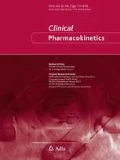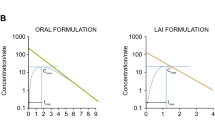Abstract
Most new drugs are marketed as single enantiomers but many older agents are still available in racemic form. As these drugs reach the end of their patent life manufacturers become interested in marketing single enantiomer equivalents. This is called ‘chiral switching’ and it has been claimed that it will bring clinical benefits in terms of improved efficacy, more predictable pharmacokinetics or reduced toxicity. We reviewed the clinical evidence and prices for three recently marketed single enantiomer versions of widely used racemic drugs: escitalopram, esomeprazole and levosalbutamol. Claims of increased efficacy were based on comparisons of non-equivalent doses and any advantages seemed small and clinically unimportant. Prices of esomeprazole and levosalbutamol were higher than their racemic alternatives and we predict that these prices will remain high despite the market presence of generic versions of the racemates. Patent protection and a perception of superiority based on promotion rather than evidence will maintian price premiums for single enantiomer drugs that are not justified on the basis of clinical performance.

Similar content being viewed by others
References
Burke WJ, Kratochvil CJ. Stereoisomers in psychiatry: the case of escitalopram. Prim Care Companion J Clin Psychiatry 2002; 4: 20–4
Tucker GT. Chiral switches. Lancet 2000; 355: 1085–7
Vakily M, Mehvar R, Brocks D, et al. Stereoselective pharmacokinetics and pharmacodynamics of anti-asthma agents. Ann Pharmacother 2002; 36: 693–701
Mehvar R, Brocks DR, Vakily M. Impact of stereoselectivity on the pharmacokinetics and pharmacodynamics of anti-arrhythmic drugs. Clin Pharmacokinet 2002; 41: 533–58
Baker GB, Prior TL. Stereochemistry and drug efficacy and development: relevance of chirality to antidepressant and anti-psychotic drugs. Ann Med 2002; 34: 537–43
Thomas JM, Schug SA. Recent advances in the pharmacokinetics of local anaesthetics: long-acting amide enantiomers and continuous infusions. Clin Pharmacokinet 1999; 36: 67–83
Stoschitzky K, Zernig G, Lindner W. Racemic beta-blockers: fixed combinations of different drugs. J Clin Basic Cardiol 1998; 1: 14–8
Greenspan FS, Dong BJ. Thyroid and antithyroid drugs. In: Katzung BG, editor. Basic and clinical pharmacology. 8th ed. New York: Lange Medical Books, 2001
Farwell AP, Braverman LE. Thyroid and antithyroid drugs. In: Hardman JG, Limbird LE, Goodman Gilman LS, editors. Goodman and Gilman’s The Pharmacological Basis of Therapeutics. 10th ed. New York: McGraw-Hill, 2001: 1565
Agranat I, Caner H, Caldwell J. Putting chirality to work: the strategy of chiral switches. Nat Rev Drug Discov 2002 Oct; 1(10): 753–68
DeVane CL, Boulton DW. Great expectations in stereochemistry: focus on antidepressants. CNS Spectrums 2002; 7 Suppl. 1: 28–33
Anon. Do single stereoisomer drugs provide value?. Therapeutics Letter 2002 [online]. Available from URL: http://www.ti.ubc.ca/PDF/45.pdf [Accessed 2004 Feb 11]
Svensson S, Mansfield PR. Escitalopram: superior to citalopram or chiral chimera?. Psychother Psychosom 2004 Jan–Feb; 73(1): 10–6
Waldeck B. Enantiomers of bronchodilating beta2-adrenoceptor agonists: is there cause for concern?. J Allergy Clin Immunol 1999; 103: 742–8
Gorman JM, Korotzer A, Su G. Efficacy comparison of escitalopram and citalopram in the treatment of major depressive disorder: pooled analysis of placebo-controlled trials. CNS Spectrums 2002; 7 Suppl. 1: 40–4
Kahrilas PJ, Falk GW, Johnson DA, et al. Esomeprazole improves healing and symptom resolution as compared with omeprazole in reflux oesophagitis patients: a randomized controlled trial: The Esomeprazole Study Investigators. Aliment Pharmacol Ther 2000 Oct; 14(10): 1249–58
Nelson HS, Bensch G, Pleskow WW, et al. Improved bronchodilation with levalbuterol compared with racemic albuterol in patients with asthma. J Allergy Clin Immunol 1998; 102: 943–52
Richter JE, Kahrilas PJ, Johanson J, et al. Efficacy and safety of esomeprazole compared with omeprazole in GERD patients with erosive esophagitis: a randomized controlled trial. Am J Gastroenterol 2001 Mar; 96(3): 656–65
Healthy Skepticism. AdWatch on Nexium [online]. Available from URL: http://www.healthyskepticism.org/adwatch/au/2003/nexium.asp [Accessed 2004 Feb 11]
Boulton DW, Fawcett JP. Beta2-agonist eutomers: a rational option for the treatment of asthma?. Am J Respir Med 2002; 1: 305–11
Asmus MJ, Hendeles L, Weinberger M, et al. Levalbuterol has not been established to have therapeutic advantage over racemic albuterol [letter]. J Allergy Clin Immunol 2002; 110: 325
Milgrom H, Skoner DP, Bensch G, et al. Low-dose levalbuterol in children with asthma: safety and efficacy in comparison with placebo and racemic albuterol. J Allergy Clin Immunol 2001; 108: 938–45
Henry DA, Lexchin J. Medicines, health and commerce: a global perspective of the pharmaceutical industry: industry as a medicines provider. Lancet 2002; 360: 1590–5
Acknowledgements
No sources of funding were used to assist in the preparation of this study. The authors have no conflicts of interest that are directly relevant to the content of this study.
Author information
Authors and Affiliations
Corresponding author
Rights and permissions
About this article
Cite this article
Mansfield, P., Henry, D. & Tonkin, A. Single-Enantiomer Drugs. Clin Pharmacokinet 43, 287–290 (2004). https://doi.org/10.2165/00003088-200443050-00002
Published:
Issue Date:
DOI: https://doi.org/10.2165/00003088-200443050-00002




